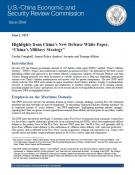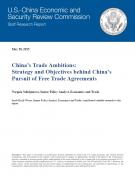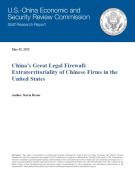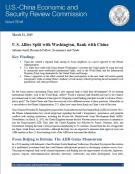Research
Research

On May 26th, the Chinese government released its 10th defense white paper (DWP), entitled “China’s Military Strategy.” DWPs—China’s most authoritative statements on national security—are published by the State Council Information Office and approved by the Central Military Commission, Ministry of National Defense, and State Council. Beijing primarily uses these documents as a public relations tool to help ease deepening international concern over China’s military modernization and answer calls for greater transparency. The new DWP tracks closely with the 2012 DWP and contains no major revelations about China’s military strategy or modernization; however, it includes some new guidance and emphasizes or clarifies certain aspects of its existing strategy, providing insights into China’s perceptions of its own security and its evolving defense priorities.
Research

This paper analyzes China’s preferential trade strategy and rationale. It finds that China has signed trade agreements primarily with countries that are neither significant in the global economy nor vital to China’s export sector. Indeed, several partners enjoy bilateral trade surpluses with China, and have comparative advantages in industries that China may want to protect from outside competition. The way in which China negotiates trade deals is also confounding. Unlike the United States, China appears to lack a modus operandi, so that the scope, strength, and details of its agreements vary widely. Some appear exceedingly generous to the trade partner, while others aggressively promote and protect domestic industries. With respect to services, investment, and other advanced provisions, China tends to fall well short of U.S. standards; yet it also demonstrates greater ambition and flexibility than developing country peers like India and Brazil.
Research

Chinese businesses participating in the U.S. financial services sector can effectively operate behind a firewall that keeps them largely immune from the jurisdiction of U.S. courts and regulatory agencies, leaving U.S. partners, competitors, and investors vulnerable. Greater legal protections for U.S. entities, including requiring Chinese firms in the United States to assign a domestic agent to receive legal papers such as subpoenas and court notifications, are a possible solution to this dilemma of jurisdiction.
Research

Key Findings:China has created a regional bank among its Asian neighbors, in a move opposed by the Obama Administration; U.S. allies have sided with China despite Washington’s concerns that China might be using the bank to circumvent more established international banks, such as the World Bank and the International Monetary Fund, long dominated by the United States and Europe; China’s supporters in the effort contend that their participation in the new bank will ensure greater transparency while avoiding China’s tendency to loan money without protecting the environment, local populations, and clean governance.
